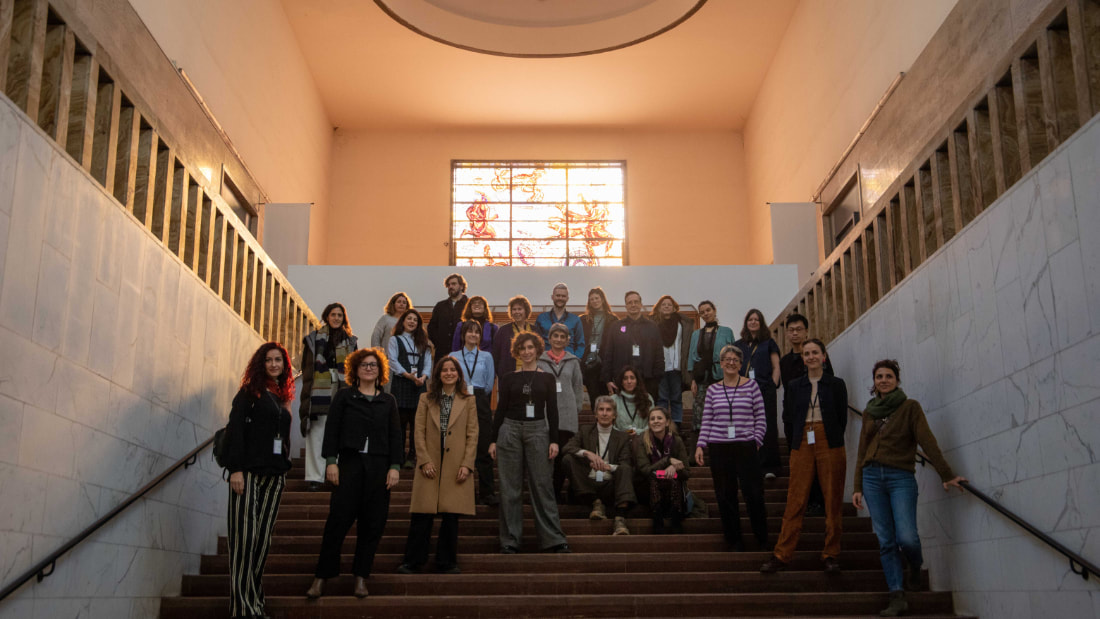Image: Ishtar, Mia Georgis in the exhibition for the first iteration of CONTESTED DESIRES at the Lit & Phil Library, April 2022
CONTESTED DESIRES: CONSTRUCTIVE DIALOGUES
What are the impacts of colonial heritage on society today and whose stories do we hear?
Contested Desires: Constructive Dialogues (CDCD) considers the problematic legacy of European colonialism. With a focus on international artistic production, exchange and learning, the programme offers unique opportunities for artists, curators and museums to explore the inequalities and gaps within the current discourse.
Funded by European Union’s Creative Europe programme, CDCD builds on its first iteration, connecting the global North and South. During the three-year project, 17 artist residencies will take place in 12 countries to create new artworks to encourage understanding and reveal untold narratives.
From the Greeks to the Romans, from the Ottomans to the seafaring nations of Western Europe, Europeans have exploited, imposed and foraged cultures and communities to build their empires. In the shadow of the complex and contested legacy of colonisation, we are hearing a clear call for a reappraisal of the way in which histories are edited and people’s heritage is presented. From the removal of historic statues and proposals for new memorials, to demands for educational reform, the repatriation of looted artefacts and reparations; citizens are rightly calling into question the connection between the past and the present, interrogating the ways that national identities are crafted and systems of oppression are upheld.
Through residencies, exhibitions and events, the programme will share its findings with communities to build a shared understanding of this colonial past and what it means to different people.
Contested Desires: Constructive Dialogues (CDCD) considers the problematic legacy of European colonialism. With a focus on international artistic production, exchange and learning, the programme offers unique opportunities for artists, curators and museums to explore the inequalities and gaps within the current discourse.
Funded by European Union’s Creative Europe programme, CDCD builds on its first iteration, connecting the global North and South. During the three-year project, 17 artist residencies will take place in 12 countries to create new artworks to encourage understanding and reveal untold narratives.
From the Greeks to the Romans, from the Ottomans to the seafaring nations of Western Europe, Europeans have exploited, imposed and foraged cultures and communities to build their empires. In the shadow of the complex and contested legacy of colonisation, we are hearing a clear call for a reappraisal of the way in which histories are edited and people’s heritage is presented. From the removal of historic statues and proposals for new memorials, to demands for educational reform, the repatriation of looted artefacts and reparations; citizens are rightly calling into question the connection between the past and the present, interrogating the ways that national identities are crafted and systems of oppression are upheld.
Through residencies, exhibitions and events, the programme will share its findings with communities to build a shared understanding of this colonial past and what it means to different people.
News and opportunties
|
Opportunity for an External Evaluation Expert with a background in cultural exchange and participation to join Contested Desires. This freelance role involves advising on data collection and contributing to programme evaluation reports.
|
We are seeking experts to join the Contested Desires Ethics Advisory Group to help guide the programme through ethical considerations, ensuring equitable and respectful engagement with artists and communities.
|
|
Are you an artist based in Chile, Cyprus, Ghana, Hungary, Italy, Netherlands, Portugal, Spain, Tunisia or the UK? Find out how to apply for Contested Desires: Constructive Dialogues in the participating countries.
|
Calling visual artists based in the North East of England with a deep interest in unravelling colonial legacies - be part of a programme that challenges the past to co-create more inclusive futures through contemporary art.
|
CONTESTED DESIRES: CONSTRUCTIVE DIALOGUES LAUNCHES IN ROMEPartners gathered in Rome to launch Contested Desires: Constructive Dialogues, a three-year programme with 17 artist residencies taking place in 12 countries to encourage understanding and reveal untold narratives about our shared colonial past.
|
The CDCD partnership extends from Europe to Chile and Ghana, including ECCOM (IT), D6:EU (CY), Interarts (ES), Xarkis (CY), BJCEM (BE), La Bonne (ES), La Fabrique (TN), H410 (NL), Creative Court (NL), Pro Progressione (HU), Museum of Civilizations (IT), Museo Egizio (IT), National Museum of Natural History and Science (PT); associate partners Cyprus University of Technology (CY), D6: Culture in Transit (UK) and Larnaca European Capital of Culture 2030 (CY); and sub-contractors the Research Centre for Museums and Galleries at the University of Leicester (UK), the Nubuke Foundation (GH) and Museo del a Memoria (CL).







